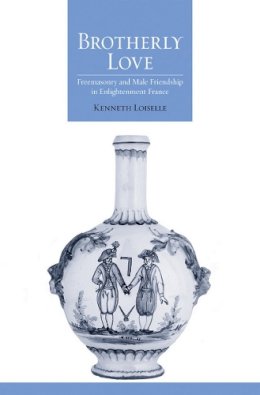
Brotherly Love: Freemasonry and Male Friendship in Enlightenment France
Kenneth B. Loiselle
Friendship, an acquired relationship primarily based on choice rather than birth, lay at the heart of Enlightenment preoccupations with sociability and the formation of the private sphere. In Brotherly Love, Kenneth Loiselle argues that Freemasonry is an ideal arena in which to explore the changing nature of male friendship in Enlightenment France. Freemasonry was the largest and most diverse voluntary organization in the decades before the French Revolution. At least fifty thousand Frenchmen joined lodges, the memberships of which ranged across the social spectrum from skilled artisans to the highest ranks of the nobility. Loiselle argues that men were attracted to Freemasonry because it enabled them to cultivate enduring friendships that were egalitarian and grounded in emotion.Drawing on scores of archives, including private letters, rituals, the minutes of lodge meetings, and the speeches of many Freemasons, Loiselle reveals the thought processes of the visionaries who founded this movement, the ways in which its members maintained friendships both within and beyond the lodge, and the seemingly paradoxical place women occupied within this friendship community. Masonic friendship endured into the tumultuous revolutionary era, although the revolutionary leadership suppressed most of the lodges by 1794. Loiselle not only examines the place of friendship in eighteenth-century society and culture but also contributes to the history of emotions and masculinity, and the essential debate over the relationship between the Enlightenment and the French Revolution.
Product Details
About Kenneth B. Loiselle
Reviews for Brotherly Love: Freemasonry and Male Friendship in Enlightenment France
Margaret Jacob
Journal for Research into Freemasonry and Fraternalism
Eighteenth-century Freemasonry has always attracted historical interest. A perennial question for historians is how far Freemasonry may have served as a link between the Enlightenment and the French Revolution. The subject has also stirred the attention of the wider public, attracted by Freemasonry's aura as a mysterious society that shrouds its arcane rituals in secrecy. The great originality of Loiselle's contribution is that he has combined his close-grained study of Freemasonry with the burgeoning interest in both the study of gender relations and the emotional history of friendship to give us a fresh perspective on a seemingly well-worn topic. Loiselle combines this new interpretive approach with a thorough grounding in much unfamiliar source material, making this a very welcome and opportune study. Loiselle shows an admirable attention to the sources, enabling him to give a convincing—and often touching—picture of what Masonic friendships meant to the men who experienced them. Loiselle states that his primary aim in this book is to use the Masonic movement as a 'prism to understand more clearly how ordinary men conceived of and lived friendship in eighteenth-century France' (p. 8). He has admirably succeeded in his purpose, giving us a historically sensitive account of the lived experience of male friendship, and what it meant to be a man, a friend, and a Mason.
Marisa Linton
H-France Review?
Kenneth Loiselle has joined together several major strands of historiography and examined a rich corpus of archival evidence to produce an important study of sociability in eighteenth-century France. The strands derive from classic and recent works on Freemasonry, social relations, gender, secularization, emotion, and the relationship between the Enlightenment and the French Revolution. Loiselle is a helpful guide to, and friendly critic of, the existing literature, and his own analysis of records from Mason lodges and correspondence between individual Masons turns what risked being a synthetic review of the familiar into an original and compelling treatment of matters central to historical study.
David G. Troyansky
American Historical Review
Kenneth Loiselle's book adds to the literature on Masonry by examining the relatively neglected topic of the private and emotional dimensions of this phenomenon. As he convincingly argues, friendship was central to the appeal and experience of Freemasonry in the eighteenth century. By studying the ritual and affective lives of Masons, this book also contributes to the burgeoning scholarship on private life, friendship, masculinity and the emotions as well as the more established literatures on how the Enlightenment was lived and the connections between the Enlightenment and the Revolution.... Loiselle is deeply engaged with the intellectual history of friendship and shows how Masons put Enlightenment ideals about the self and society into practice.... One of the merits of this book... is that it does not just consider norms and discourses but also the experience of Masonic friendship and shows the constant interaction between these two domains.
Sarah Horowitz
French History
This well-documented study is the fruit of much archival research in the Masonic collections of the Bibliothèque nationale de France and numerous regional collections. An enjoyable read, the work successfully places the project of Masonic practices in their social and cultural environments in a convincingly analytical and varied way. Beyond the Masonic realm, it brings a stimulating contribution to the study of masculine sociability in the eighteenth century.
Pierre-Yves Beaurepaire
Annales
